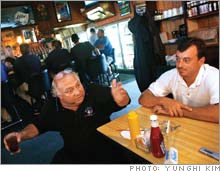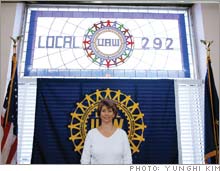|
Last call for a union town Delphi's bankruptcy has Kokomo, Ind., hurting. People here know the auto industry's in trouble - but that's about all they agree on.
(FORTUNE Magazine) -- Every town needs a place like Ned's Corner Pub. It is Kokomo's main watering hole, its town square, the hub of its nervous system. The smoke-filled joint offers classic sports-bar ambiance: four TVs, a hopping jukebox, and cold beer. Ned himself is no longer with us (his sons, Mario and Dean Glunt, run the place now), but he still keeps an eye on things from an oil portrait over the bar. Folks gather under his gaze for the tastiest pork tenderloin sandwich in town, repeated playing of the place's anthem, Molly Hatchet's "Gator Country," and talk about the Chicago Cubs.
But these days conversation never strays for long from the subject that has preoccupied everyone here for months: the fallout from the bankruptcy filing last autumn of Delphi (Charts), the auto parts maker that is Kokomo's No. 2 employer. With Delphi cutting jobs and slashing wages, there are plenty of opinions about what it all means, but not much consensus. One Friday night in July, Darrin Zadra, a local contractor, talked about how his business has ground to a halt. Michael Spear, a real estate developer, said he sensed opportunity: There will be a lot of new retirees around soon with buyout checks to spend. Ned's son Mario sympathized with the people who've been lining up for the new, lower-wage replacement jobs Delphi's been offering. A few weeks earlier, Bob Martin, a 37-year Delphi veteran with a Kris Kringle beard who is being forced to retire, was in Ned's steaming about his reduced income and the future of his benefits. He mentioned his wife's rare blood disease and swore, "If something happens to her because of this, I will take this to the streets. And I'm not the only one." The threat of a strike hangs over the place. The end of the social contract Kokomo, it turns out, is a good town to visit for a close-up look at how 21st-century globalization is redefining not just business practices and the myth of the American dream but the social contract between workers and employees - and between neighbors forced into competition with each other. After all, it is in places like Kokomo (pop. 45,000) that the big abstract stuff that has long been roiling American business - from the huge costs of health insurance and pension plans to the decline of organized labor - moves from the theoretical to the painfully real. What Delphi's controversial CEO, Robert "Steve" Miller, calls the "necessary bitter pill of restructuring" is not a sound bite here. It is a fact of life that has exposed once-hidden divisions of class, age, and outlook in a town that has long defined itself as solidly and proudly middle class. "Kokomo always had the appearance of a boomtown, with high wage levels and stable jobs," says William Mello, a professor of labor studies at the University of Indiana at Kokomo. "Reality is knocking on Kokomo's door now." A generation ago a wave of manufacturing job losses in Kokomo might have galvanized all the working people to line up together (as, in fact, they did in the 1980s when Chrysler, the town's No. 1 employer, went through its own bankruptcy saga). That hasn't happened this time. Rather, the Delphi bankruptcy has to some degree broken the town into pieces. "We're lifelong neighbors and friends," says Sona Camp, president of United Auto Workers Local 292. Yet those bonds are under newfound pressure. "The town is changing for good," Camp says. "It's no fun for any of us." Painful restructuring Kokomo is world headquarters to Delphi's electronics and safety division, a high-tech operation that produces audio, entertainment, safety, and security systems for GM and other carmakers. While Delphi, which has factories around the world, has been hemorrhaging money (it lost $2.4 billion in 2005 and expects to lose another $2 billion in 2006), the Kokomo plant has been profitable. It currently churns out one million integrated circuits a day and in 2005 was responsible for $456 million in Kokomo salaries. That proved no protection when CEO Miller took the company into Chapter 11: The plant was lumped into Delphi's overall restructuring plan. While the outcome is far from finalized, as part of a deal worked out this summer between management and the UAW, 1,200 of the union's 2,300 workers at Delphi in Kokomo will be taking some form of retirement (underwritten by GM, Delphi's main customer and former owner). About 700 others are hoping to transfer, or "flow back," to a GM (Charts) plant somewhere else in the country - because their Delphi jobs as they've known them will no longer exist. The remaining 400 or so UAW workers will be choosing between a lump-sum buyout or a probable 50% cut in pay. Not surprisingly, there are a slew of angry UAW members in Kokomo - the town's most outspoken faction - who are trying to decide what to do. "My phone has been ringing off the hook with frightened people looking for advice," says UAW local 292 chaplain Thelma Corbitt, herself retired from the plant. Most are furious at the company, calling the entire bankruptcy a fraud, an effort to renege on legitimate union contracts. Some, like Bob Martin, 63, an old-school UAW member, say the union itself has been complicit: "The union betrayed me, the company betrayed me, my government betrayed me. [Delphi is] just trying to get rid of its contracts, and the union has rolled right over." There have been rumblings in Kokomo of UAW splinter groups, complete with angry anti-union meetings and an incendiary website. Others turn defensive - if not about the UAW per se, then about the idea that workers somehow brought this on themselves by weighing down carmakers with undeservedly fat union contracts and retiree benefits. "Everyone hates us," says union member and Delphi worker Shawn Nevin, 37. Nevin builds circuitboards and is a skilled worker whose expertise can't easily be replaced. He feels his contributions to the company - and to a profitable plant - deserve to be rewarded and protected. "Can't they see that everyone has benefits because of unions?" he asks. But elsewhere among the Kokomo community are quieter voices that seem to be saying, "Get over it and move on already: The days of union protection are dead." While you'd be hard-pressed to find anybody who says he's happy about what's happening to the Delphi workers, some do see the bankruptcy as an opportunity. Pay disparity Most of Delphi's union production workers are paid around $27 an hour (skilled tradespeople make more), and the company is now hiring folks to fill some of those newly vacant jobs at $14 an hour. And from Kokomo townspeople further down the economic food chain than the long-standing union workers, there's been plenty of interest. Marilyn Bersbach, a hospital supervisor, says several members of her housekeeping staff are eager for a way into Delphi. "It would be a big step up for them. They're making $7.50 to $8.50 an hour, and they're champing at the bit to make $14," she says. Theresa Chase, 36, has already been hired as a new "temporary worker," which means a 15% raise from her job as a legal secretary. Even without benefits - she doesn't get them now anyway; the lawyer she works for can't afford them - she's thrilled. "I just want to get my foot in. And I'm hoping the benefits will come," she says. She does worry about how she'll be treated by the older workers who will be training her - there have been rumors of tension at the plant. Her front line of protection, ironically, is the UAW itself: Temporary workers are union members, even though they get no benefits. "We'll be looking out for them," says the UAW's Camp. Political fallout The fractures in the town may be most embodied in the fate - and popularity - of Kokomo's mayor, Matt McKillip, a 44-year-old Republican. McKillip is a Kokomo native and was elected two years ago on a platform that in part professed a determination to see the town freed from its reliance on the auto industry. Yet in the wake of the Delphi bankruptcy, his popularity is plummeting. While he is talking about a lot of things that need to be talked about - finding new employers, embracing a post-union future- he's not making a lot of friends doing it. Before he was mayor, McKillip spent ten years working at Procter & Gamble (Charts) in the U.S. and abroad, then started a technology consulting firm in town in 1998. He sounds like a human PowerPoint presentation: He's fond of his five-point "strategic plan," which includes such things as a grant program to entice college-educated people who work in town to buy homes there ("Project Grow Kokomo"). He's been mocked as an out-of-touch yuppie and come under fire for his trips abroad trying to lure foreign businesses, as well as for his campaign to brighten up the city with flowers and new street signs. He's also been bashed for having pushed a recent steep property-tax hike. "I've taken some flak," he says. "But we knew coming in that the diversification of the economy was important because we're such a heavily automotive town." Those in Kokomo fighting the new reality may have no choice before too long. Last fall Delphi asked U.S. bankruptcy judge Robert Drain in New York to release it from all its union contracts. The judge deferred taking up that request until this month to give the company and the unions time to negotiate. UAW leadership lately has complained publicly about the pace of those negotiations and threatened to strike if Judge Drain agrees to Delphi's request. Recently the judge allowed Delphi to make bonus payments to retain key managers - the company wants to dole out up to $37.9 million to 460 executives for the second half of 2006. The decision has predictably riled union members back in Kokomo. "This is all about corporate greed," insists George Anthony, Local 292 shop chairman. On any Friday night at Ned's that opinion would draw some cheers and a few rolled eyes. What no one would argue is that change is here. And that Kokomoans will keep gathering to visit, drink beer, play the jukebox - and talk about the one thing that's on everybody's mind. _____________________________ |
|


